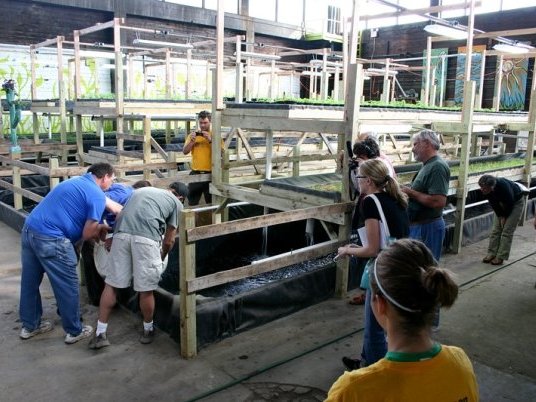If you visit both Growing Power Farms on Milwaukee's North Side and the newly opened Sweet Water Organics, 2151 S. Robinson Ave., in Milwaukee's Bay View neighborhood, you can see how innovation spawns inspiration.
Sweet Water Organics, a full production fishery in Milwaukee, utilized the trial and error expertise of Growing Power founder Will Allen to replicate a system of aquaponic farming.
"Sweet Water Organics is a marriage of artists, artisans, mechanics, scientists, engineers, teachers and storytellers. This could not have happened with out the support of so many people around the world," James Godsil, owner and founder says.
Housed in Bay View's outer industrial edge, owners Josh Fraundorf, Steve Lindner and James Godsil transformed warehouse space into three (eventually to be four) operating fish troughs or raceways. Dug directly into the concrete flooring, these 11,000 gallon channels are six feet deep, holding either yellow perch or tilapia.
"Our goal is to create protein in a way respectful of Mother Nature's rules. Eventually, we hope to fee fish without drawing upon fish because our waterways are in drastic need of re-population. We want to relieve the ocean from the pressure of providing protein," Godsil says.
Native to the region, yellow perch were chosen thanks to a market demand in the Milwaukee area. In all, about 5,000 yellow perch and 33,000 tilapia were placed into separate tanks at Sweet Water. According to Fraundorf, Lindner and Godsil, yellow perch should be ready to harvest this winter and tilapia in about nine months.
"Right now, we're using some of the best commercial food but we are comitted to raise enough worms so that our fish will eventually live off of what we grow," Godsil says.
While yellow or lake perch are native to the Midwestern region, they require water temperatures of about 71 degrees. Likewise, tilapia require a warmer water temperature, about 84 degrees, so external pool heaters simulate the corresponding natural habitat.
In the abstract, an aquaponic system suggests complexity and confusion. But, once broken down, the method is simple. Essentially, the mechanics take a nod from nature and replicate the organic symbiotic relationship between plants, animals and water.
The basics are this. Water from the channel is pumped upwards into two levels of pea gravel. The water then flows across the pea gravel where hard-working bacteria break down extra food and ammonia from fish wastes, converting it into nitrates that plants can absorb.
In the middle bed this nutrient-rich water is filtered by tiny watercress plants, and in the top bed it fertilizes potted herbs, sprouts, and vegetables. Then the naturally cleaned water pours back down to the fish channels.
Sweet Water, like Growing Power, also grows worms. Contained in 26 wooden bins, worms are fed a compost mixture of coffee grounds, cardboard, brewer's yeast and food scraps from a composting station behind the building. The subsequent worm castings (excrement) have proven to be vital to the system providing soil with rich minerals and nutrients. Sweet Water not only intends to sell worms and soil to gardeners but also sprouts, herbs, micro-greens and produce.
"We really have a mixed model of business. We are a for-profit enterprise aiming to develop 21st century sustainable jobs in the community but we also act as a blank slate to be filled with the appropriate people who show up and want to develop cooperatives," Godsil says.
For now, Sweet Water may be focused on perfecting their product but, their larger vision intends to improve on their community. A community composting project, Sweet Water Agrarian Guild School and Winter Farmers Market are just a few of the projects currently in the works.
"Sweet Water is really a blend of Sweet Water Olds and Sweet Water Youngs. Some of us were children of the civil rights, peace, women's and historic preservation movements. The Sweet Water Youngs are children of the Obama Movement. We're really diminishing generational problems and increasing generational cooperation," Godsil says.
OnMilwaukee.com staff writer Maureen Post grew up in Wauwatosa. A lover of international and urban culture, Maureen received a bachelor’s degree in sociology from the University of Wisconsin-Madison.
After living on the east side of Madison for several years, Maureen returned to Milwaukee in 2006.
After a brief stint of travel, Maureen joined OnMilwaukee.com as the city’s oldest intern and has been hooked ever since. Combining her three key infatuations, Milwaukee’s great music, incredible food and inspiring art (and yes, in that order), Maureen’s job just about fits her perfectly.
Residing in Bay View, Maureen vehemently believes the city can become fresh and new with a simple move across town.




